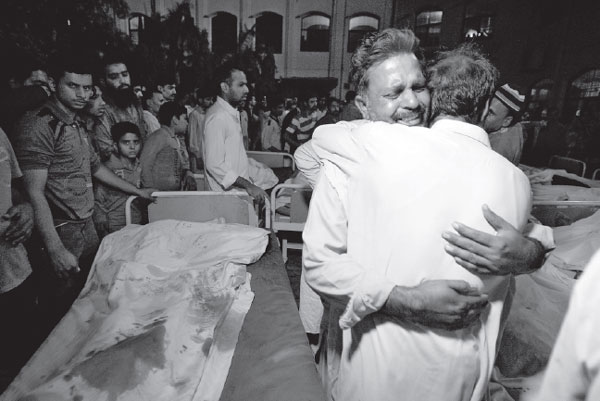India, Pakistan alerted to threat
Intelligence agencies were both warned about planned attack on Wagah border crossing
Indian and Pakistani intelligence agencies both detected plans for an imminent strike on their Wagah border ahead of a suicide blast that killed 57 people on Sunday, and heightened security possibly averted a more devastating attack.
Pakistani police said on Monday they had recovered a "huge" cache of weapons and explosives near the border, where thousands of Indians and Pakistanis gather at dusk every day to watch a flamboyant traditional parade by their security forces.
Pakistani police spokeswoman Nabeela Ghazanfar said the latest death toll was 57 after the bomber detonated explosives in a car park 500 meters from the border gates and parade ground, just as hundreds of spectators were returning from the ceremony.
Pakistani and Indian agents, who are arch-rivals and do not share intelligence, gave conflicting accounts of whether the bomber's true intention was to cause casualties on the Indian side of the border and stir up tensions between the nuclear-armed nations.
"It appears the bomber wanted to target ground zero where Pakistan and India border officials stand together to perform the flag ceremony but he could not enter due to tight security on the last gate," a Pakistani intelligence official told Reuters.
"Had he managed to reach the place, there would have been the worst scenario for both sides."
If successful, such an attack would likely have severely tested ties between India and Pakistan, already frayed after weeks of shelling further along the border killed 17 people in October.
Another source said a second suicide vest had been found in a field near the explosion site, suggesting there might have been another bomber.
"The target - the border facility that symbolizes trade and interaction between India and Pakistan - is a tempting one for extremist Pakistani groups that want conflict with India and oppose any detente or cooperation with New Delhi," said Bruce Riedel of the Brookings Institution, a former adviser on South Asia to US presidents.
The border remained open on Monday, but both sides suspended the daily flag-lowering ceremony for the first time since they fought a war in 1971, as a mark of respect for the dead, India's Home Ministry said.
Indian Prime Minister Narendra Modi condemned Sunday's attack as a "dastardly act".
"My condolences to the families of the deceased. Prayers with the injured," he said on Twitter.
India and Pakistan have fought three wars since they were carved out of British India in 1947. They fought a limited conflict in 1999 and were again on the brink after a militant attack on India's parliament led to troop build-ups in 2002.
'Red alert'
An official from India's foreign intelligence service, the Research and Analysis Wing, said the blast at the border was squarely aimed at Pakistan's security forces, a version in line with several Pakistani Taliban splinter groups that claimed the attack as revenge for an army offensive against militants near the Afghanistan border.
An Indian official said the Home Ministry received two intelligence warnings in mid-October of possible attacks along the border or at the nearby Golden Temple in the city of Amritsar, the most sacred site for Sikhs.
"Based on these reports the Border Security Force was ordered to upgrade security and a red alert was also issued," said a senior home ministry official. The official declined to be named because he was not authorized to speak to media.
|
A Pakistani mourns the death of a relative who was killed in a suicide bomb attack at the Wagah border crossing near Lahore on Sunday. At least 45 people were killed, the police said, just after a daily ceremony on the Pakistani-Indian border when troops from both sides simultaneously lower the two nations' flags. Mani Rana / Reuters |
(China Daily 11/04/2014 page11)









